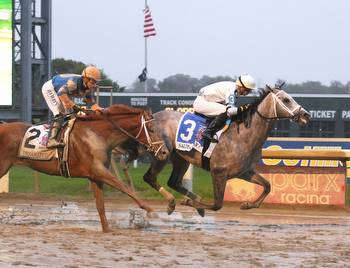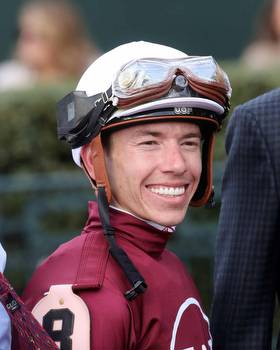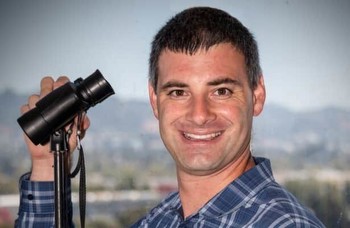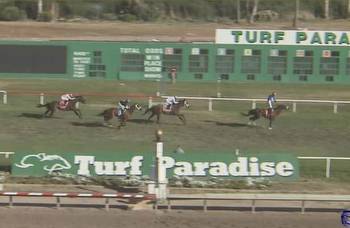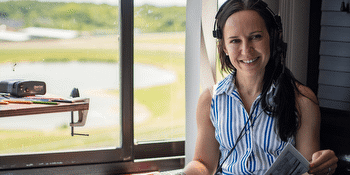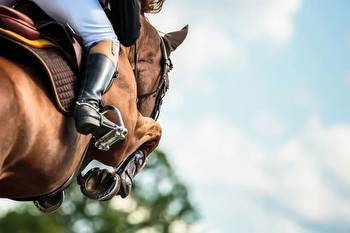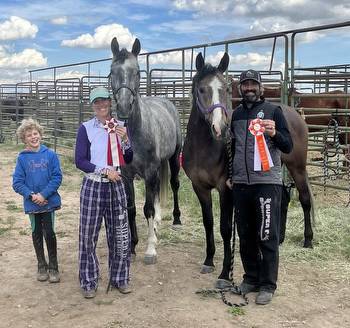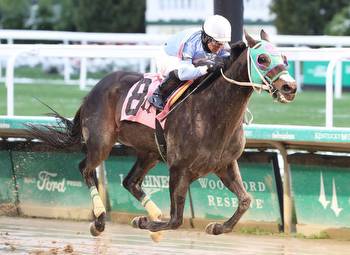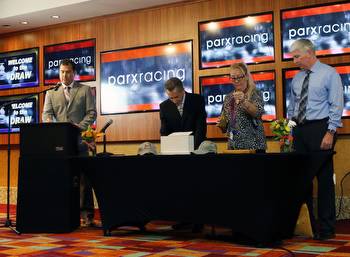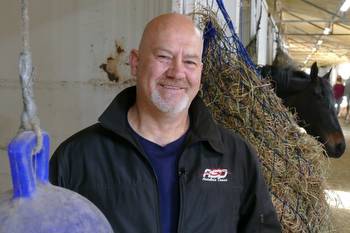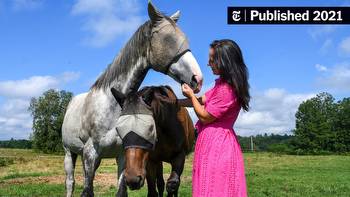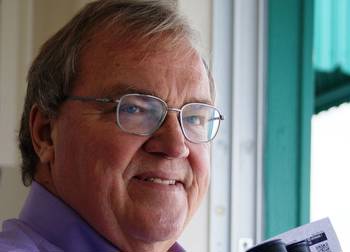Groundbreaking horse racing announcer finds her voice at Pa. racetrack
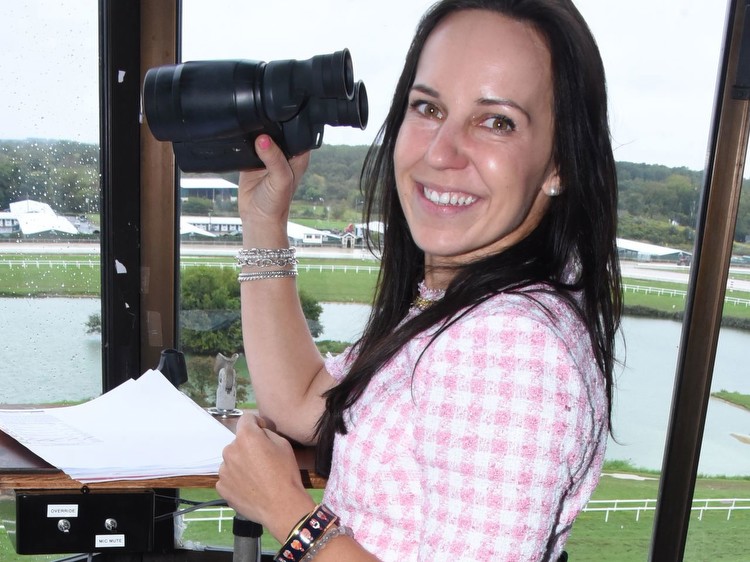
“And so far, she hasn’t run. Though I swear she’s had her moments,” – Billy Joel.
Jessica Paquette didn’t get much restorative sleep during the early days of autumn.
Paquette, currently the only female racetrack announcer in the country, is putting the finishing touches on her first year behind the microphone at Parx Racing in Bensalem.
The 38-year-old Rowley, Mass. resident placed an exclamation point on her body of work by breaking ground as the first woman in the world to call a Grade 1 Thoroughbred race on Saturday, Sept. 23.
Paquette announced two Grade 1s, races reserved for horses at the highest level of competition, back-to-back that afternoon as a wicked nor’easter raged outside.
First up was the Cotillion Stakes for three-year old fillies followed by the Pennsylvania Derby for three-year-old males. Each race carried a $1-million purse.
Fittingly, almost karma-like, the Cotillion Stakes winner was filly named Ceiling Crusher.
“My knees almost buckled when that filly crossed the finish line,” Paquette said. “I do think that it was fitting that I called my very first race because of a tornado and the biggest race of my life with a nor’easter in the background.”
Days later, Paquette departed on a red-eye flight to Arcadia, Calif. and participated in the inaugural Horse Racing Women’s Summit at Santa Anita Park.
Then, it was right back home to New England, where Paquette competed in a Massachusetts Horsemen’s Council Days of Champions equitation event, two years removed from sustaining a broken back and a traumatic brain injury in a riding accident.
Immediately following, it was back on the road for the five-hour drive to Bucks County for another three-day week of race calling.
Tired probably doesn’t start to describe it, but Paquette wore a broad smile while sitting in her announcer’s perch above the racetrack recalling it all.
“It’s easy to get overwhelmed when you have so many things on your plate at once,” she said. “I think it’s all a matter of perspective and for me, I try to take everything with the idea of ‘I get to’ rather than ‘I have to.’ If you kind of come from a place of gratitude to do all these things – sure it’s exhausting, but, sleep, I’m not really getting enough of that.”
THE ‘WEIRD HORSE GIRL’
Paquette describes herself as a ‘weird horse girl’ who started admiring equines at a tender age.
“Everyone growing up remembers that kid growing up, doodling horses in their notebook and writing book reports on horses. I had a lot of teachers who told me I needed to broaden my horizons. I would love to go back to them now and say, ‘look where my narrow horizons brought me.’
“It was all horses, all the time, since I was a little kid and we didn’t have a lot of money, so horses and riding were a world away for me. So that’s how I found the racetrack,” she said.
Paquette began her career at the now-defunct Suffolk Downs in East Boston as an intern.
“Suffolk Downs wound up being one of the great loves of my life,” Paquette said. “It was a labor of love, a team I was very lucky to work with and got to learn so much. At a small track, you get to do so many things, because there’s no one else.”
Paquette served as the track’s television broadcast analyst, its senior director of communications and its senior vice-president of marketing over a 13-year span.
“That’s one of the sad parts about the landscape of racing changing and small racetracks going away. People are going to get less opportunity to be a Jess of all trades,” Paquette said.
AN EXISTENTIAL CRISIS
Suffolk Downs shuttered in 2019 and Paquette referred to that heart-wrenching time as an ‘existential crisis.”
“It was trying to figure out what was next. My entire life had been Suffolk Downs. It was hard to figure out what the next step was like,” she said.
Paquette took to the road, working as a on-air analyst at seasonal racing meets at Sam Houston Race Park in Houston and Colonial Downs in New Kent, Va.
Her first opportunity to call a horse race came at Sam Houston, which didn’t have a track announcer for its quarter horse season.
“They had guest announcers every weekend and they asked if I wanted to do it. And I said, why not, what’s the worst that can happen,” she said.
Parx Racing, originally named Keystone Racetrack when it opened in 1974 and later known as Philadelphia Park, had three full-time track announcers: Jack Lamar from 1974-87, Keith Jones from 1987-2020 and Chris Griffin in 2021-22.
Paquette accepted the position last November. “I think they liked what they saw as far as my work ethic, my enthusiasm and the knowledge of racing I brought,” Paquette said.
Her duties include reading the day’s program scratches and changes and providing analysis and selections for each race. Paquette introduces each horse and jockey in a race during the post parade and calls the live action once the starting gate springs open.
She also hosts two weekly vignettes – “The Inside Track” and “War Horse Wednesday” – shown on Parx’s in-house TV feed. They’re also seen Saturday mornings on the “Let’s Go Racing,” show on NBC Philadelphia and available to watch online.
SOCIAL MEDIA BACKLASH
Racing fans are creatures of habit who are used to doing – and hearing – the same thing day in and day out.
The sound of a woman behind the microphone at a racetrack that gets serious attention on FanDuel TV and off-track wagering sites didn’t sit well.
Some took to social media to lambaste Paquette for every minor faux pas, many times in a cruel and vicious fashion. And it continues. Sometimes mercilessly.
Paquette tries to let it roll off her back. Yet, it’s difficult to bear.
“It’s hard doing a new job anyhow, let alone with doing it so publicly and making every green mistake publicly,” Paquette said. “And, then having the Internet criticize every mistake you make. I welcome all sorts of constructive criticism. But there are some folks that take it to a cruel, vulgar level that is beyond anything constructive or helpful.
“You never really get used to it. And anyone who says ‘just don’t read it’ – they’re lying. If there were people talking about you on the Internet, you would read it. I try not to take it personally, even if folks make it quite personal,” she said.
BREAKING THE CEILING
Paquette admits shedding tears of frustration during her first months on the job.
“I never really called Thoroughbreds before and I was really determined to get as good as I can,” she said. “But I’m a perfectionist. So, when I wasn’t great immediately, I said, oh, no, what am I going to do? You put your head down and make tiny improvements that eventually add up.”
Paquette worked tirelessly on finding the right voice to project through the microphone.
“As a woman, the last thing I want is to be called shrill. For me, it was tough to find the level of excitement to rise to the moment. I can’t yell like some of the male announcers. It’s not going to work with my voice. So, there’s a lot of trial and error,” she said.
Paquette uses the five-hour automobile commute back and forth to the Boston suburbs twice a week for some well-deserved down time.
“I actually find the commute pretty relaxing,” she said. “I listen to books on tape and try to take it as a relaxing, entertainment moment for myself. I catch up on phone calls. The commute’s not always great. Eventually, I’ll wind up moving down here. It’s just waiting for the right time.”
OVERCOMING PHYSICAL ADVERSITY
Paquette wears a leather bracelet on her left wrist with a gold plate attached that bears the engraved words What a Trippi.
It’s the name of a retired Thoroughbred horse she adopted almost 15 years ago after a nine-win career from 42 starts.
“For me, Thoroughbred aftercare is such an important part of racing and kind of been at the heart of everything I’ve been involved in.” said Paquette, who served as director of communications for the Thoroughbred Retirement Foundation.
She lovingly refers to What a Trippi as “the bad horse” on social media and is often posts videos feeding him frosted Pop-Tarts and other treats. Paquette’s face lit up as she called him the perfect horse of a lifetime.
“He’s everything good about a Thoroughbred,” Paquette said. “He’s a great show horse and taught me so much about being a rider and a horse person.”
Paquette currently rides Emilio, a yellow, half-Thoroughbred/half-Clydesdale she owns in the equestrian show ring, having recovered from injuries sustained in a riding accident.
“Two years ago, Oct. 1, 2021, I was riding a young horse I was thinking about buying, and a truck backfired and she bolted,” Paquette said. “I fell off very hard and shattered my L4 (vertebrae) and gave myself a really good concussion. I was in the hospital for about five days. I couldn’t walk.”
Surgery was avoided and Paquette, a marathon runner, was back on her feet in four months.
“Emilio has been the most wonderful partner as I’ve come back from my injury and started horse showing again,” Paquette said. “He makes me very confident.”
Paquette also laced up her runner’s shoes again and ran in this year’s Boston Marathon. She’s currently training for the Nov. 5 New York City Marathon.
LEAVING HER MARK ON THE SPORT
It’s been a big year for women in horse racing, from Paquette working as a track announcer to trainer Jena Antonucci becoming the first to woman win the Belmont Stakes, the third jewel of racing’s Triple Crown, with Arcangelo.
Paquette’s role at the inaugural Horse Racing Women’s Summit was as a panelist for a discussion dubbed “Running the Show,” which covered roles in the sport that aren’t immediately thought of as for women.
“I think it’s a big honor to have the opportunity to leave the sport a little better and a little more inclusive than it was when I got here,” Paquette said. “Representation matters and I grew up idolizing (legendary racing broadcaster) Charlsie Cantey and wanting to be a broadcaster, because I saw women doing that.
“It didn’t occur to me that an announcer was a job for a woman,” Paquette said. “So, I’m hoping there’s a generation of little girls behind me that look to me and say, hey, I can do that, and I can probably do it better.”
Paquette doesn’t see herself vacating the Parx announcer’s booth anytime soon.
“I’m open to wherever this adventure takes me down the road,” she said. “This is all already bigger than my wildest dreams, so it’s only as big as you can dream.”
Thanks for visiting PennLive. Quality local journalism has never been more important. We need your support. Not a subscriber yet? Please consider supporting our work.









